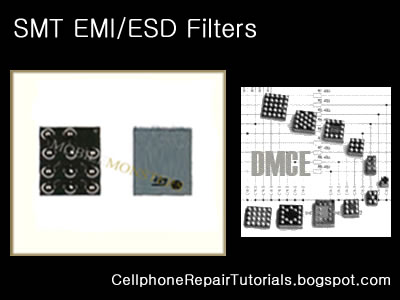Electrostatic discharge (ESD) is the sudden and momentary electric current that flows between two objects at different electrical potentials caused by direct contact or induced by an electrostatic field. The term is usually used in the electronics and other industries to describe momentary unwanted currents that may cause damage to electronic equipment.
ESD is a serious issue in solid state electronics, such as integrated circuits. Integrated circuits are made from semiconductor materials such as silicon and insulating materials such as silicon dioxide. Either of these materials can suffer permanent damage when subjected to high voltages; as a result there are now a number of antistatic devices that help prevent static build up.
Below are common types of EMI-ESD protection chips used among various mobile phone's circuit.
Electromagnetic interference (or EMI, also called radio frequency interference or RFI) is a disturbance that affects an electrical circuit due to either electromagnetic conduction or electromagnetic radiation emitted from an external source. The disturbance may interrupt, obstruct, or otherwise degrade or limit the effective performance of the circuit. The source may be any object, artificial or natural, that carries rapidly changing electrical currents, such as an electrical circuit, the Sun or the Northern Lights.
EMI can be intentionally used for radio jamming, as in some forms of electronic warfare, or can occur unintentionally, as a result of spurious emissions for example through intermodulation products, and the like. It frequently affects the reception of AM radio in urban areas. It can also affect cell phone, FM radio and television reception, although to a lesser extent.

Custom Search
Blog Archive
Popular Posts
-
How basically Cell-phone works? In this lesson we are going to take a brief familiarization of a typical block diagram of a cellphone. B...
-
Odin Flasher Tool for all Samsung Android firmware. The Odin flasher software has been used to manually install Samsung original stock firmw...
-
These are Nokia Mobile Phone Flashfiles or Firmwares that is used to Flash or Installed to the Phone using a flashing devices tools when it...
-
This is where you can learn a step by step from basic to advance procedure on how to fix major mobile phone handsets problems such as Nokia,...
-
Understanding Mouthpiece or Microphone, Earpiece and IHF or Buzzer Speakers Circuit on mobile phonesA mobile phones microphone or mouthpiece is a component used to convert sound signal into an electrical signal. The earpiece speaker is the ...
Labels
- Advance Turbo Flasher Guide
- Android OS / Windows Mobile Hard Reset Guides
- Android Software Tools
- Apple iPad 2
- Apple iphone
- apple iphone 4
- Apple iPhone Firmwares
- Application Support
- AxeBox Guides
- Blackberry FAQ
- BlackBerry Hardware Repair Guides
- Blackberry MEP Reader
- Blackberry Torch 9800
- Cell Phone Repair Tips
- China Phone Hardware Solution
- China Phone Chips
- China Phone Pinouts
- China Phone Schematic Diagram
- China Phone Tools
- China Phones Flashfiles
- CPF-BOX II Guides
- Cruiser Team Product Guides
- Cyclone Box Guides
- Digi Mic Knopfler
- Disassembling Manuals and Video Guides
- Free Unlocker Software Tools
- Furious Gold Guides
- Google Nexus S
- HTC Hard Reset
- HTC Service Manual
- HTC Software Tools
- Htc Unlock
- Infinity Box Guides
- iPhone Jailbreaking
- iPhone Software Solution
- iPhone Software Tools
- iPod Touch Firmwares
- jaf box repair
- Japanese Phones
- Kyocera Hard Reset
- LG Hard Reset
- LG Firmwares
- LG Schematic Diagram
- LG Software Tools
- Memory card format sofware
- Mobile Phone Codes
- Mobile Phone Repair basics
- MOBILedit
- Motorola Firmwares
- Motorola Hard Reset
- MXKEY Guides
- Nokia Hardware Repair Solutions in EXE
- Nokia IC Datasheet
- Nokia Software
- Nokia 5310 Xpressmusic Repair Guides
- Nokia 5730 Xpressmusic Repair Guides
- Nokia 5800 Xpressmusic Repair Guides
- Nokia BB5 Flashfiles
- Nokia Connectivity Cables
- Nokia DCT3 DCT4 WD2 Flashfiles
- Nokia Flashfiles
- Nokia Hard Reset
- Nokia Hardware Solutions
- Nokia N900 Repair
- Nokia Pinouts
- NOKIA PM /Rpl Files
- Nokia Schematic Diagram
- Nokia Smartphones Hard Reset
- Nokia Software Tools
- Nokia Solutions in shell
- Nokia Spare Parts Compatible
- Nokia X2 Repair Guide
- Odin Flasher
- Online Spare Parts Store
- Sagem Software Tools
- Samsung Flashfiles
- Samsung Hard Reset
- Samsung Service Manual
- Samsung Smartphone OS
- Samsung Tool
- SE USB Driver
- Security Phone Code Reset
- Sharp Schematic Diagram
- Siemens Schematic Diagram
- Smart Phone Software Tools
- Smartphone ROM Firmware
- Software Support
- Sony Ericsson Experia Neo
- Sony Ericsson experia X1
- Sony Ericsson Experia X10
- Sony Ericsson Experia X10 mini
- Sony Ericsson experia X8
- Sony Ericsson Flashfiles
- Sony Ericsson Hard Reset
- Sony Ericsson PlayStation phone
- Sony Ericsson Shematic Diagram
- SonyEricsson FAQ
- Spiderman Box Guides
- Sprint 7700 hardware repair
- Vygis Toolbox Guides
- Z3X Guides
Copyright © 2011 - 2012 Free CellPhone Repair Tutorials | Powered by Blogger





0 comments:
Post a Comment